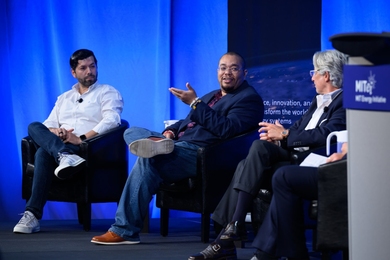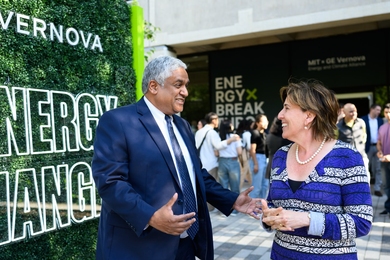Ritu Raman, a postdoc in the Langer Lab at MIT, has been honored as one of five recipients of the 2017 L’Oréal USA For Women in Science Fellowship.
The L’Oréal USA For Women in Science Fellowship recognizes female scientists at a critical stage in their careers and supports them with $60,000 grants to advance their postdoctoral research. The announcement was made on Oct.10 in conjunction with Ada Lovelace Day — an annual event aimed at raising the profile of women in STEM. The fellows were chosen based on their intellectual merit, research potential, scientific excellence, and their commitment to supporting women and girls in science.
As part of the honor, the recently-selected fellows have the freedom to apply their grants to enhance their postdoctoral research in any way they see fit. Raman plans to use the award to conduct pioneering research and collaborate with other scientists, engineers, and clinicians across the country. Other fellows will use their fellowship to hire female mentees, build coding programs, fund educational campaigns, and more.
In November, the fellows will travel to Washington to join the American Association for the Advancement of Science's Science and Technology Policy fellows on Capitol Hill for an informal gathering on science policy and careers. They will also visit the National Academy of Sciences (NAS) for a roundtable discussion on the barriers and opportunities for women in science with the NAS Committee on Women in Science, Engineering, and Medicine.
Emphasis on education
While growing up in different places across the globe — including India, Kenya, and the U.S. — Raman witnessed firsthand the disadvantages her talented colleagues in each of these regions faced when it came to gaining adequate opportunities and resources to pursue careers in STEM fields.
“I went to school with classmates who were excelling beyond everyone else in STEM subjects, yet didn’t have the resources or the opportunities to pursue a career in these fields,” Raman recalls. “It’s frustrating; we have so many problems [in science and engineering] to solve and we can’t miss out on anyone who can offer their talents.”
Raman says that these early life experiences inspired her to become a staunch advocate for STEM education and outreach, and to focus on empowering women and underrepresented minorities to pursue degrees in STEM fields.
She has been actively involved with various outreach endeavors, including the University of Illinois chapter of the Graduate Society of Women Engineers, which she helped found and grow during her time as a graduate student at the University of Illinois at Urbana-Champaign.
Raman currently serves on the Women in Academia Committee for the national chapter of the Society of Women Engineers, and confers with other postdocs, young faculty members, and others across the country about the advancement of women in engineering and technology.
She is also a volunteer for the Koch Institute for Integrative Cancer Research’s Public Outreach Program, through which she speaks with middle and high school students about life in the lab. This spring, Raman worked with fellow Koch Institute researchers to design and build a cancer research-themed mini-golf course for the Cambridge Science Festival — which aims to engage people of all ages in STEM learning through multifaceted, multicultural events.
But Raman’s interest in making science and technology accessible to diverse audiences is not just extracurricular. During her time at the University of Illinois, she helped to design and lead a course that focused on teaching students the process of ethically designing, building, evaluating, and optimizing bio-hybrid robots targeted at a variety of applications, and she has carried this experience with her to MIT as well.
Bio-hybrid design
In the lab of Institute Professor Robert Langer at MIT's Koch Institute for Integrative Cancer Research, Raman focuses on developing adaptive materials for long-term sensing and drug delivery in some of the most challenging environments in the body. She is currently working with fellow Langer Lab researchers to create a long-lasting capsule that can safely and effectively deliver drugs to the stomach. She also collaborates with researchers in the Cima and Graybiel labs to build implantable devices for drug delivery to the brain.
Raman says her decision to join the Langer Lab, the largest biomedical engineering lab in the world, was based largely on her passion for bio-hybrid design, which involves developing systems that are half biological and half synthetic.
“A lot of labs today do not have the experience to build both biological and synthetic materials,” she says. “That’s why I came to the Langer Lab and MIT — to learn how to design and build new synthetic materials so I can one day start a bio-hybrid design-based lab.”
Sharing her knowledge with others remains a central tenet of Raman’s endeavors, however. Recently, she guided students through designing an implantable pump that can deliver drugs to the brain, helping to diagnose and treat brain disorders, specifically anxiety and depression.
With bio-hybrid design still a relatively new approach, Raman plans to one day apply her experience in STEM education to develop curriculum in this area, including teaching others how to build with adaptive materials and guiding students to explore the ethics of building with biology. She also hopes to empower future scientists and engineers to effectively write about science policy to advocate for more government support.
“My goal is to teach the next generation of inventors to build with biological and synthetic materials in synchrony,” Raman says. “I appreciate that L’Oréal recognized not only women who are pursuing research in science and engineering, but those who have dedicated a lot of time to STEM outreach and education.”









